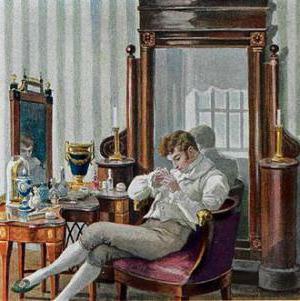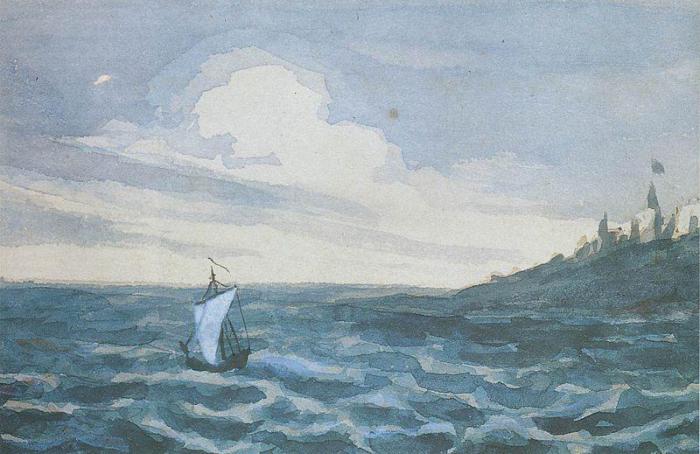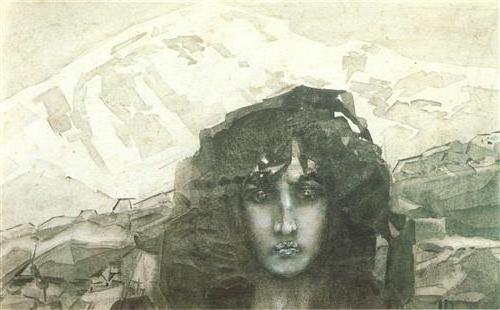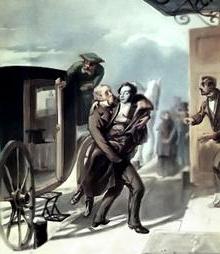The work of the Russian classic Mikhail Yurievich Lermontov, we all know from school. His works are included in the compulsory training program. In any genre, Lermontov is brilliant and inimitable, although he considered himself not perfect enough to be printed next to his teacher and idol Pushkin. That is why he begins to publish his works only after the death of Alexander Sergeyevich.
Lermontov's works in the school curriculum
Mikhail Yuryevich Lermontov was so talented and gifted that during his very short life he managed to leave unto descendants cultural wealth in the form of poems, poems, novels, short stories, short stories, etc. At one time, he added to the link of the great geniuses of classical Russian literature, whose work is taught in the lessons. Lermontov’s works in the school curriculum introduce children to what worried people of that time, what inspired them and what killed them. Lermontov's poetry was written in a very distinctive, beautiful and original language. Many still remember by heart the poem “Borodino” and are well acquainted with such famous works as “The Prisoner of the Caucasus”, “Hadji Abrek”, “Mtsyri”, “Demon”, “Death of the Poet”, “Sail”, “Dagger” , "Duma", etc.
"Hero of our time"
For a deeper study of the works of M. Yu. Lermontov, one of his unique creations was included in the school curriculum. He is the novel “Hero of our time”, thanks to which Lermontov was considered a real literary innovator of the 30-40s of the XIX century. The great creator in his works was distinguished by a romantic orientation. His novel was written in prose with an original creative approach to the cyclization method. He gave us the epoch-making image of Pechorin - a man who turned out to be superfluous in his rebellious time.

The work itself does not have a chronological and temporal sequence, but consists of completely separate short stories, travel essays, novels and diary entries. Six chapters could be arranged in a completely different order. But for Lermontov, this is not the value, but the fact that in the foreground he has a more accurate disclosure of the personality of the main character Pechorin, his image and his experiences. The storytellers are three people: an observer - a traveling officer, a friend - Maxim Maksimych and the main character - Grigory Pechorin.
First, the reader superficially analyzes the psychology of Pechorin, then in more detail, and at the end the deepest psychoanalysis takes place. The novel "Hero of Our Time" was written by Lermontov in 1840, just a year before the tragic duel. And almost immediately it was printed in the St. Petersburg publishing house of Ilya Glazunov.
"Sail"
In the sixth grade, students begin to study the famous poem “Sail”. Lermontov wrote it as a student on the threshold of important changes and trials for him, while walking along the shores of the Gulf of Finland in 1832. Then he was only 17 years old. Due to a quarrel with the teaching staff, he was forced to leave Moscow University and forget the career of a philologist. He had to move to St. Petersburg and enroll in the School of Guards Warrant Officers and Junkers. And therefore, the basis of the poem “Sail” Lermontov put all his worries and thoughts about his uncertain past and yet unclear future.

The poem consists of three stanzas in which vivid characteristic images, poetic melodicity, deep feelings of feelings and maturity of thought are presented. The sail in this case acts as a lyrical hero, in front of whom the sea landscape is changing. And all this accurately reflects his psychological state. The image of the sea is a sign of life's ups and downs, and sail is the soul of man. The sail confronts the elements, like the man himself, thrown into a sea of worldly problems, who is infinitely lonely among the same people floundering there.
"Demon"
According to the school curriculum, children study another very original work - the poem "Demon". Lermontov, like many Russian writers, is fond of images of evil spirits, and at the same time uses folk epos, legends and biblical events. In his poem The Demon, Lermontov warns how naive a person is, how easily he can succumb to temptation and go straight to hell. Lermontov began to write this poem, unusual in its allegorical and beautiful, at the age of 15 and worked on it for 10 years. The plot is based on a biblical legend, which speaks of how God cast out the spirit of Evil from heaven, who opposed his authority and himself wanted to become the God of Heaven. And then he attributed to her a Caucasian old legend about how the mountain spirit of Hood, jealous of the girl Nino to her lover, both filled up with a snow avalanche.

And Lermontov Demon creates similar to the spirit of Hood, who already knew no malice and doubt, a long time outcast, he did not seek shelter, he despised the limitations in time and space of human existence. And suddenly he was defeated - he was in love with the beautiful Tamara, this love tempted and ruined her, but only the angel saved and opened the gates of paradise, but the Demon was again completely alone and eternal torment. An attempt to be reborn through love failed. Lermontov Demon regrets, and this sadness slips in a few lines and thereby touches the soul of the reader.
Golden poetry
The school program of Lermontov’s poems about autumn could not but include, because a whole “golden” cycle is dedicated to this period. It is the dreary and damp autumn season that excites the tender romantic soul of the young poet, who gradually turned from an obedient and humble boy into an irritable and indefatigable lad who had already managed to become disillusioned with life and did not see any sense in it. He admires the fading of nature and the nature of completing a certain cycle in life, and now he is preparing to dutifully accept everything that fate will prepare for him. The school curriculum of Lermontov’s poems about autumn could not help but include.
"Autumn"
Lermontov “Autumn” wrote in 1828, when he was only 14 years old. This poem has become one of the striking examples of the poet's love for his native nature. At that time he studied at a boarding house and was preparing to enter the university. Leaving his studies, he came to his grandmother’s estate in the suburbs and walked a lot, admiring the local countryside. It was there that he first appreciated the extraordinary beauty, luxury and grandeur of Russian nature. He was visited by a magical muse, he began to create, and magnificent poems turned out. Lermontov’s poems about autumn are shocking with their unusual melody and picturesque descriptions of this dull season of the year, which always brings a slight sadness about the past time and about unfulfilled hopes.
"Death of poet"
The studied works of Lermontov in the school curriculum include the famous poem "The Death of the Poet." For Lermontov, Pushkin was an idol, he always admired his work. Therefore, the sudden death of Pushkin was a real shock for Mikhail and caused great indignation and shock. It is under such a strong impression that he writes this poem, where he exposes the conspiratorial plans of high society against the brilliant poet. The poem "The Death of the Poet" consists of two parts, the first of which describes the whole tragedy that occurred on January 27, 1837. And Dantes Lermontov does not at all declare him a murderer, although he does not justify him, but high society, which laughed at the poet and often humiliated and insulted him whenever possible. Lermontov accuses the close circles of the murdered poet of hypocrisy, empty praise and miserable words of excuse. Although Lermontov in his lines hints that Pushkin knew his killer in the face and the reason for his death, which was predicted to him by a fortuneteller in his youth.

In the second part, Lermontov incriminates the so-called “golden youth” of the illustrious fathers, who now, of course, will avoid punishment. However, he warns of God's judgment, before which, sooner or later, each of them will have to appear. For this bold poem, Lermontov will be sent to exile in the Caucasus. And then he, like Pushkin, will be killed in a duel.
Conclusion
The poet could not go unnoticed, no matter how his enemies tried to do it. Lermontov's works in the school curriculum occupy a large section. The poet combined in his work the eternal philosophical questions that always worried mankind, he was a real rebel and went against all manifestations of the world order. At times, he was like his heroes, he also felt, suffered and loved. His temperament was very similar to Pushkin, they both wanted attention and attracted him to themselves, as they could, sometimes with silly ridicule in the form of epigrams or free behavior at social balls, as well as whims and insults. Their subtle soul was vulnerable and poorly protected, therefore, God did not give them much time for life. But it was not in vain that they lived their century. Now we can only be proud that such great people lived on our land. And now they have become the real property of Russian literature.